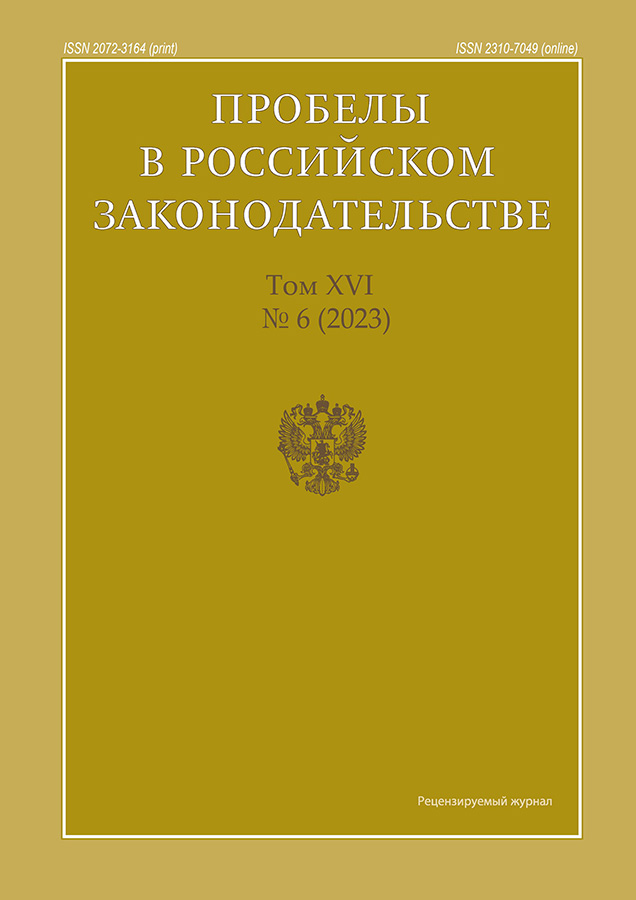Modern Trends in Interregional Cooperation Between the Subjects of the Russian Federation and African Countries
- Authors: Logvinova I.V.1
-
Affiliations:
- Moscow Metropolitan Governance University
- Issue: Vol 16, No 6 (2023)
- Pages: 249-256
- Section: International Legal Sciences
- URL: https://journals.eco-vector.com/2072-3164/article/view/623630
- EDN: https://elibrary.ru/NWNBDO
- ID: 623630
Cite item
Abstract
The modern foreign policy of Russia is aimed at developing sustainable cooperation with the countries of Africa in spite of the lack of stability on the continent for the most part. In this regard, it is important to take into account the potential of regional participation in the realization of the consistent foreign policy course of the country. The subjects of the Russian Federation can make a significant contribution to educational, economic, cultural cooperation, as well as interact with almost all social, humanitarian and economic aspects with the countries of Africa. However, there are objective problems in the development of such regional interaction. The article identifies a number of such problems on the basis of systemic and historical approaches. Conclusions about the prospects of cooperation between the subjects of the Russian Federation and African partners are drawn with the use of formal-legal analysis of the Russian federal model.
Full Text
About the authors
Inna V. Logvinova
Moscow Metropolitan Governance University
Author for correspondence.
Email: Logvinova_inna@mail.ru
Scopus Author ID: 369558
Cand.Sci.(Law), Associate professor
Russian Federation, MoscowReferences
- Abramova I.O., Fituni L.L., 2017. Adaptation of the “African vector” of the foreign economic policy of the Russian Federation to the changing economic situation on the continent // Scientific notes of the Institute for African Studies of the Russian Academy of Sciences. 2017. No. 1(38). pp. 24-36.
- Abramova I.O., Fituni L.L., 2021. Russia’s Strategy in the African Direction: what has Changed Since the Russia-Africa Summit 2019? World Eсonomy and International Relations. 2021. Vol. 65. No 12. P. 68-78. https://doi.org/10.20542/0131-2227-2021-65-12-68-7.
- Aleshin K.A., Sugakov G.K., 2022. The new contours of the Russia-Africa partnership: the economic, political, cultural-humanitarian and youth dimensions // Moscow University Bulletin of World Politics. 2022. No. 1. P. 192-200.
- Bakov A. A., Kerimov A. A., 2018. Regions as an effective participant in international relations: conditions for the formation of new practice in international activities // Socio-political sciences. 2018. No. 4. pp. 42-46.
- Dubrovina O. Yu., Plotnikova O. V., 2016. International links of regions of States: characteristics and features: textbook. Moscow. 2016. 192 p.
- Konstantinova O.V., 2021. Russia Trade with Africa: The Current State of Affairs. Outlines of Global Transformations: Politics, Economics, Law. Vol. 14, No 3. P. 227-242 (in Russian). doi: 10.23932/2542-0240-2021-14-3-13.
- Korendyasov E.N., 2016. Russian-African relations at a new start // Bulletin of the Russian Peoples' Friendship University. Series: International relations. 2016. No. 2. P. 203-214.
- Medushevsky N.A., 2020. Analysis of the Russian model of strategic interaction with African countries // Theories and problems of political research. 2020. Volume 9. No. 5A. pp. 95-106. doi: 10.34670/AR.2020.27.58.011.
- Mensah K.M., 2014. Progressive formation of the Economic Community of West African Countries (ECOWAS) for the purpose of economic integration // Business in Law. Economic and legal journal. 2014. No. 2. P. 245-246.
- Putin V.V., 2023. Russia and Africa: : Joining Efforts for Peace, Progress and a Successful Future. Access mode: http://www.kremlin.ru/events/president/news/copy/71719 (access date 07/24/2023).
Supplementary files









